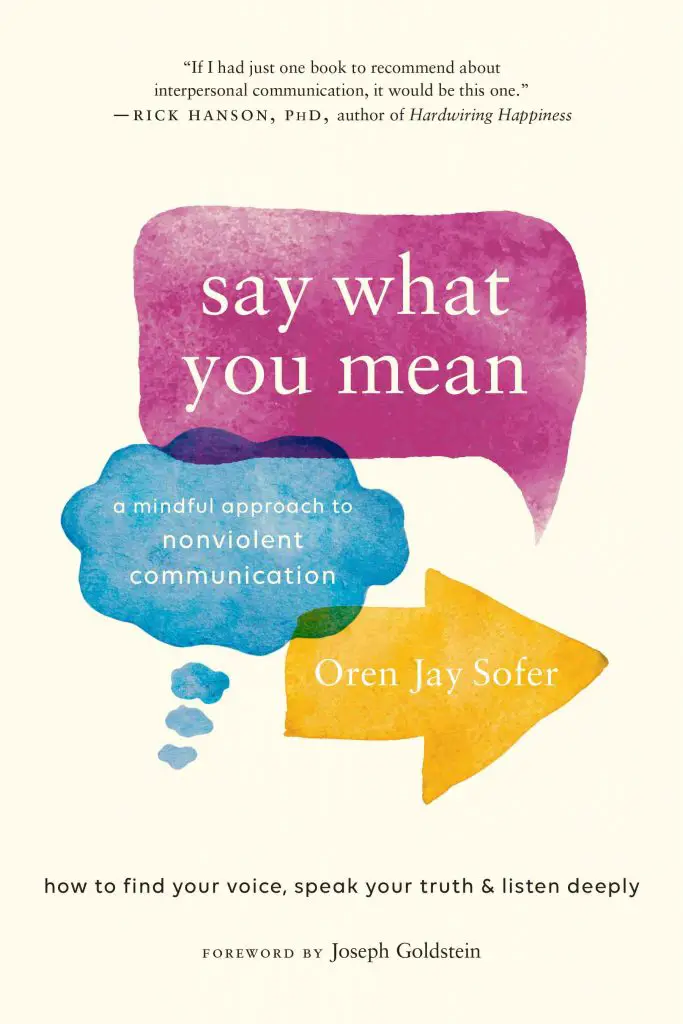Difficult conversations are a part of life. Having good communication skills doesn’t mean we never argue; it means having the tools, strength, and confidence to navigate tough situations when they arise.
Whether it’s the coworker with that uncanny ability to push our buttons, simmering tension with a friend, or a charged conversation with relatives at Thanksgiving, we each have our share of challenging moments to muddle through. I remember many family arguments that ended with someone storming out of the room—in a huff, or in tears.
When faced with conflict, we often fall back onto default patterns hard-wired into our nervous system. We may freeze: alarm bells are ringing inside but the flow of speech suddenly dries up. We may go on the attack, raising our voice in a show of power that either ignites or quells the situation, but resolves nothing. Or we flee, literally or figuratively backing away, getting small, or otherwise ceding ground to keep the peace.
Instead of these unconscious defense mechanisms, we can develop a few core capacities to hold our own and stay engaged in tense moments. If we can bring some balance, patience, and a spirit of curiosity to the conversation, we may find something valuable waiting on the other side.

1. KNOW WHEN TO PAUSE
Perhaps the most essential skill in difficult conversations is the ability to be aware of our internal state and self-regulate. When tensions flare it sends a cascade of signals through our mind-body: stress hormones are released, our breathing changes, emotions rise, and our thoughts race.
When our nervous system is over-activated we lose access to important functions like clear thinking, empathy, and perspective taking. The first order of business is to come back into balance.
Mindfulness is a tremendous resource here. Feeling our body, noticing thoughts and attending to our breathing can help us stay balanced. Remembering to take even one deep breath can make a world of difference. Feeling our feet on the floor can bring much-needed ground to the storm.
Conflict also tends to narrow our attention. The mind focuses on our emotions, judgments, or the other person’s words or behavior, and we lose perspective. Literally widening your visual field of attention can help bring things back into balance. Orient to your surroundings: notice the space around you, the sounds in the room.
If we lose the ability to stay balanced, we may need to pause the conversation altogether. I’ve rarely seen a conversation result in anything useful when neither person can listen. If you need to take a break, be sure to mention two things:
a) Affirm your intention to figure things out, listen, or connect, otherwise the other person is likely to interpret your stepping away as a rejection or dismissal
b) Propose a specific time frame to return to the topic (“in a few hours, tomorrow”) which reduces anxiety.

2. BE MINDFUL OF YOUR JUDGMENTS AND INTERPRETATIONS
Human beings make meaning—we look for patterns, interpret events, and judge our environment. This is a critical and useful function of the mind. In fact, it’s so powerful that we often mistake our judgments and interpretations for reality.
“You’re being hostile … rude … disrespectful.”
“I feel abandoned … betrayed … manipulated.”
What do all of these words have in common? They’re judgments about the other person’s behavior or intentions. We interpret their actions and make it mean something.
Someone may raise their voice or roll their eyes. If we’re unaware of the difference between their actions and our interpretation, we stay locked in a reactive state and are unable to see things from another point of view. How would I respond if I interpret the same behavior as a desire to be seen? As a need for autonomy?
Try to be clear about the difference between your interpretations and the objective reality. Speak directly to the reality rather than your assumptions.

3. LISTEN AND EXPRESS YOUR DEEPER INTENTIONS
Whenever you’re in conflict, aim to listen first. People are generally more willing to listen when they feel heard. Focus your listening in two ways:
a) Try to give the other person the experience of feeling heard. What could you do or say that would help them to feel understood?
b) Check that you’re understanding what matters to them. You don’t have to agree with their views, interpretations, or requests. Instead, try to hear what matters: how are they feeling? What do they value or need?
Explicitly stating your desire to understand and work things out also can have a stabilizing effect on the conversation. Let them know where you’re coming from. If someone genuinely trusts your intention to connect, they don’t need to fight as hard to be hear
4. RETURNING TO A CONVERSATION
If you do take a break, use your time well in the interim and pick things up on a positive note.
Do you whatever you need to get support. Talk to someone who can offer some empathy for your feelings, and try to get clearer about what’s actually at stake for you in this situation. What matters here? What makes you lose your cool? Does it have to do with old wounds or patterns outside of this specific situation?
Once you feel more settled and clear, stretch your heart to imagine what’s going on for the other person. How might they feel? What might they need or want that you can relate to? Can you open your heart to them?
Finally, when you do return to the conversation, do your best to start with something affirming. Express appreciation or share something connecting. If you misspoke previously, step up and take responsibility as a way of clearing the air. Or, as above, state your intention to figure things out and work together.
I hope these tips help you find some ground intense moments. Whenever possible, remember to start small. Try not to tackle the most difficult conversation first! Build your capacity slowly and work up to the more challenging ones.
Related: How to Handle Difficult Conversations with Your Partner
About the author:

Oren Jay Sofer is the author of Say What You Mean: A Mindful Approach to Nonviolent Communication. He leads retreats and workshops on mindful communication at meditation centers and educational settings around the United States. A graduate of the IMS-Spirit Rock Teacher Training Program, he holds a degree in Comparative Religion from Columbia University, teaches in the Insight Meditation community, and is a Somatic Experiencing Practitioner and a Certified Trainer of Nonviolent Communication. Oren creates mindfulness training programs for a number of organizations, including Mindful Schools, Kaiser Permanente, and 10% Happier. He lives in Richmond, California.
Originally posted on January 4, 2019 @ 9:00 am



